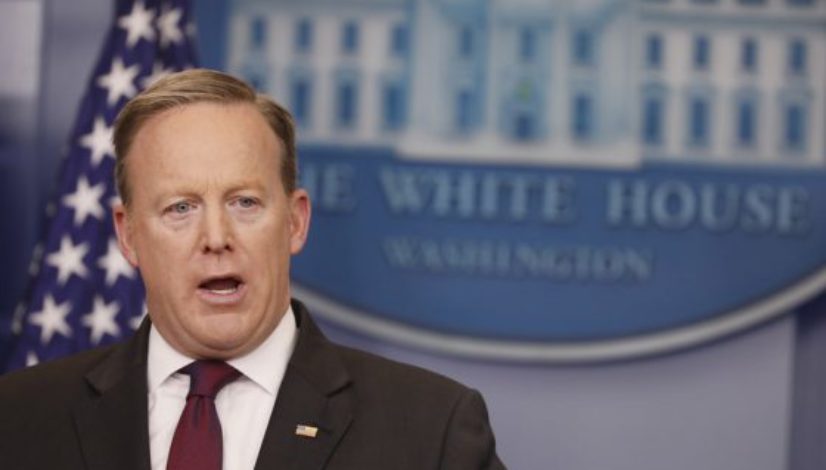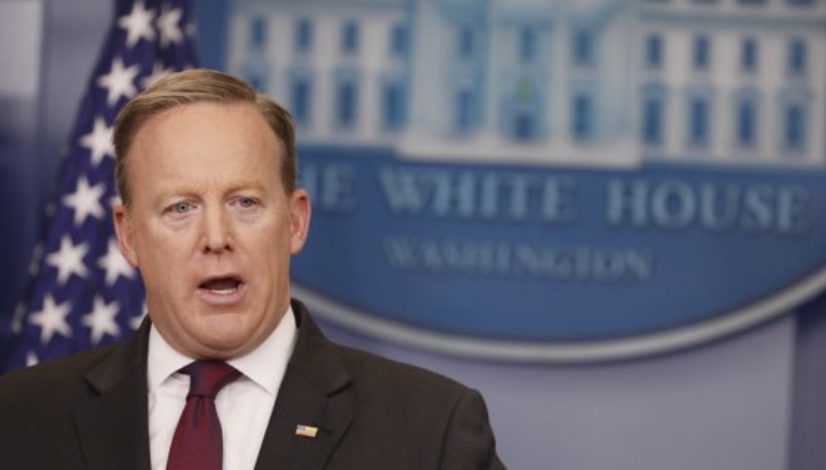Trump administration puts recreational marijuana in crosshairs

Published: Feb 23, 2017, 2:14 pm • Updated: Feb 27, 2017, 7:09 am
By Alicia Wallace, The Cannabist Staff
States where recreational marijuana is legal will be subject to “greater enforcement” under the Trump administration, White House spokesman Sean Spicer said Thursday.
But watchers of America’s multibillion-dollar weed industry are waiting to see whether Spicer’s statements during his daily briefing actually yield a real shift in enforcement policy.
“There’s a big difference between (medical marijuana) and recreational marijuana, and I think when you see something like the opioid addiction crisis blossoming in so many states around this country, the last thing we should be doing is encouraging people,” Spicer said, giving the first glimpse of the new administration’s views of the growing legal cannabis industry. “There is still a federal law that we need to abide by in terms of recreational marijuana and other drugs of that nature.”
Marijuana remains illegal under federal law, although voters in Colorado and seven other states and Washington, D.C., approved measures to legalize recreational pot sales and consumption. Medical marijuana is legal in 28 states, Puerto Rico, Guam and the District of Columbia. Public opinion has grown more favorable on the topic, as seen in a Quinnipiac poll released earlier Thursday, which found 71 percent of Americans surveyed would oppose a federal crackdown on legal marijuana, and 93 percent are in favor of medical marijuana.
Related stories
- Maine police group asks for clarification from Trump on marijuana rules
- Trump won’t “turn his back” on Colorado pot laws, GOP lawmaker says
- Colorado gov on “Meet the Press”: It’s unclear whether Trump administration could stop legal marijuana
- Marijuana industry, angered by White House reversal, speaks out
- Transcript: Here’s everything Sean Spicer said about marijuana
When asked about increased enforcement around recreational pot, Spicer said: “That’s a question for the Department of Justice. I do believe that you’ll see greater enforcement of it.”
Mark Bolton, marijuana advisor to Colorado Gov. John Hickenlooper, said it would be premature to speculate about the administration’s intentions.
“We have worked with the Department of Justice since legalization to develop a framework that respects voters and promotes public safety,” he said in an e-mail.
Brookings Institution drug policy expert John Hudak said the White House statement “is not a death knell for recreational marijuana, nor is it clarification.”
Hudak said a troubling aspect of the briefing was Spicer’s “clear lack of understanding of federal law.”
Spicer claims there’s a difference between medical marijuana and recreational marijuana, Hudak said.
“I think it’s true in practice, it’s true in public opinion, but it’s not true in federal law,” Hudak said. “Medical marijuana is just as illegal as recreational marijuana.”
And yet, the Rohrabacher-Farr Amendment keeps the Department of Justice from spending money to enforce the Controlled Substances Act in medical marijuana states, he said.
“I think what is said from the podium and what happens in policy often have a disconnect,” Hudak said.
Pushing back in Congress
Uncertainty has lingered for months around how the Trump administration might handle the topic of marijuana legalization.
“The president has said time and again that the decision about marijuana needs to be left to the states,” U.S. Rep. Jared Polis, a Boulder Democrat, said in a statement about Spicer’s comments. “Now either the president is flip-flopping or his staff is, once again, speaking out of turn. Either way, these comments leave doubt and uncertainty for the marijuana industry, stifling job growth in my state.”
Polis is a member of the congressional Cannabis Caucus, along with Earl Blumenauer, D-Oregon, whose state started recreational sales in the fall of 2015.
“The national prohibition of cannabis has been a failure, and millions of voters across the country have demanded a more sensible approach. I’m looking forward to working with the leadership of our newly formed cannabis caucus to ensure that these wishes are protected,” Blumenauer said in a statement.
Colorado, which in 2014 became the first state to initiate recreational marijuana sales, recorded $1.3 billion in medical and recreational cannabis sales in 2016. Sales nationwide are projected to reach $24.5 billion by 2025, according to a report issued earlier this week by industry analytics firm New Frontier Data.
Adhering to Cole Memo for now
After winning the election, President Donald Trump nominated Alabama Sen. Jeff Sessions a vocal opponent of legalization, as the nation’s attorney general. This raised questions about the direction the Department of Justice would take regarding the 2013 Cole Memo, which established guidance for when federal prosecutors should enforce U.S. marijuana laws.
All U.S. attorneys, including Bob Troyer, the acting U.S. attorney for Colorado, operate under the Cole Memo. While Spicer’s comments Thursday indicated new guidance may be coming, nothing new has been handed down.
“We will follow that guidance until, if or when, we receive new or amended guidance,” said Jeff Dorschner, a spokesman for the U.S. Attorney’s Office in Colorado.
In Washington state, which started recreational marijuana sales halfway through 2014, state Attorney General Bob Ferguson said he would fight any federal intervention on his state’s cannabis laws.
“We will resist any efforts to thwart the will of the voters in Washington,” Ferguson said Thursday, according to a report from the Associated Press.
Colorado Republican Sen. Cory Gardner said he was assured before Sessions’ confirmation that there would be no drastic changes to federal policy, Bloomberg reported.
“That was the take-away from my conversation with Jeff,” he told Bloomberg. “It’s not a priority of the Trump administration.”
In a follow-up statement sent to The Denver Post, Gardner’s press secretary Alex Siciliano said the senator is awaiting further clarification from the administration.
Trump has wavered on the marijuana legalization issue, but said on the campaign trail that he favors states’ rights and would not interfere even with legal recreational-use states such as Colorado.
Andrew Freedman, a marijuana regulations consultant who previously served as Colorado’s director of marijuana coordination, said that it would be a very complicated exercise — especially legally — to unravel the regulations put in place by states such as Colorado, Washington and Oregon. The federal government also would be going against the will of voters who told their states to develop regulations, he said.
“States are set up to be laboratories of democracy,” he said.
States argue that by regulating the sale of pot they can help ensure public health and safety.
Freedman worries that if the feds try to undo the regulated pot industry, “in that vacuum it would be the black market that comes in to fulfill the supply.”
Economic impact
- Report: America’s marijuana industry headed for $24 billion by 2025
- ‘Building the airplane while it’s being flown’: How California looks to build $7B legal pot economy
- Don’t tread on weed: A plea to Trump administration to let marijuana legalization proceed
- Struggling Canadian province anticipates ‘thousands of jobs’ created by marijuana
Dan Anglin, the chairman of the Colorado Cannabis Chamber of Commerce, said he was surprised by Spicer’s statements. A crackdown would harm the president’s popularity considering that legalization has broad support across the nation, he said.
“The administration has its hands full with a lot of other things which they intended to change,” he said. “This didn’t seem like something that was at the top 100 of President Trump’s list.”
Anglin didn’t expect an immediate crackdown, but said he wouldn’t be surprised if cannabis businesses received legal notices to stop selling and growing. If that does happen, he said he hopes Attorney General Cynthia Coffman will step up to defend Colorado’s constitution.
In the meantime, Anglin said it will be business as usual at his Boulder edibles company, Americanna.
As a voting Republican, Anglin said he was disappointed by the federal government stepping in on what he called a states’ rights issue.
“If we were issued a federal order to cease and desist, we would,” Anglin said. “However, I would imagine that many of us — if not all of us — would join in a suit against the federal government for making such a decision.”
Nevada Senate Majority Leader Aaron D. Ford released a statement saying Nevada Attorney General Adam Laxalt “must make it immediately clear that he will vigorously defend Nevada’s recreational marijuana laws from federal overreach. Not only did voters overwhelmingly vote to approve the legalization of recreational marijuana, the Governor’s proposed education budget depends on tax revenue from recreational marijuana sales. Any action by the Trump administration would be an insult to Nevada voters and would pick the pockets of Nevada’s students.”
Tom Angell of drug law reform group Marijuana Majority said: “If the administration is looking for ways to become less popular, cracking down on voter-approved marijuana laws would be a great way to do it. On the campaign trail, President Trump clearly and repeatedly pledged that he would leave decisions on cannabis policy to the states. With a clear and growing majority of the country now supporting legalization, reneging on his promises would be a political disaster and huge distraction from the rest of the president’s agenda.”
Updated Jan. 24, 2016 at 4:11 p.m. The following corrected information has been added to this article: Because of a reporting error, this story has been updated to reflect the jurisdiction of Bob Troyer, acting U.S. attorney general for Colorado.
Denver Post staff writers Danika Worthington, Noelle Phillips and Mark Matthews contributed to this report.
Watch: Trump tells Fox News and a rally of supporters how he feels about marijuana. In both, he distinguishes between medical and recreational cannabis:
Topics: Department of Justice, donald trump, federal enforcement, Jeff Sessions, medical marijuana, recreational marijuana, Sean Spicer, Trump administration
 Alicia Wallace
Alicia Wallace
Alicia Wallace joined The Cannabist in July 2016, covering national marijuana policy and business. She contributes to the Denver Post’s beer industry coverage. In her 13 years as a business news reporter, her coverage has spanned the economy, Sports…




